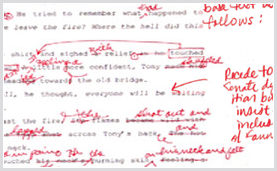
We asked some authors to share the best advice they have ever received from their Penguin Random House editors.
Below, we explore the evergreen topic of the best editorial advice you have received. Next month, we’ll explore the question “How do you overcome writer’s block?” Submit your answers for inclusion here.
The Best Suggestion I Ever Got from My Editor
1. Play the long game
“I remember being so caught up in the second-book curse (it won’t be as good as first; that first book was a fluke) that I couldn’t write it. Yet many writers are able to write, then let it go and immerse themselves in their next book. My editor reminded me that the next book is always better. Make room for it. Bear in mind that it can take five books before people begin to recognize your work, so you are writing toward your sixth.”
2. Use detail judiciously
“Detail in your writing is fine, but you have to know when to use it and when clarity is more important.”
“Just one tip? As the book’s momentum builds, stop having your characters describe every street they walk down!”
3. Don’t get distracted
“It’s easy to get distracted around launch time with parties, interviews, and social media. But keep writing, even in the swirling hype of promoting your current book.”
4. Pull back
“I wrote an epilogue for my novel and during the editing process, my inclination to overwrite it was strong. My editor helped me pinpoint the exact note I wanted to hit in that short space, which meant that I could pull back on the rest. The result was an epilogue that feels like a small, closing echo of the larger story. Readers often tell me that it’s their favorite part of the book.”
5. Keep the reader turning the pages
“Whether you’re writing fiction or nonfiction, always be aware of the reader’s experience of moving through the narrative. Pacing can be just as important as a compelling plot or well-developed characters: try to identify—and remedy—passages or chapters in the book that slow the reader down and interfere with his engagement in the story.”
6. Keep sight of the “so what?”
“For my (nonfiction) projects, my editor is always telling me to make sure my narrative illustrates a larger argument. It’s too easy to lose sight of the forest for the trees. Now I keep a watchful eye to ensure that the text never wanders too far afield from the animating idea and builds to a conclusion that supports and advances my original thesis.”
7. It’s your name on the book
“With my first novel, I was overwhelmed by the fourteen-page editorial letter I received. I felt mired in fear that if I made all the changes asked of me, any iota of the book I began with would disappear. But my editor reminded me that it was my name—not his—that would be plastered on the cover. Ironically, that reminder gave me the ultimate control to accept many of the changes he was urging me to make, to envision the (much-improved) book he knew was inside my draft, and to feel empowered to push back on the changes that were non-negotiable. It’s a little mantra I say to myself now with every book when it hits that discouraging editorial slump: ‘It’s my name on the book.’”
8. Sometimes no is yes
“When my book was on submission, the woman who would become my editor stayed up all night (the first night we sent it to her!) reading it. She dreamed about the setting and the characters, but she hated the ending, and, as a result, felt she had to pass. But what she had to say about the ending was so generous and smart that I realized she was right, and I rewrote the last twenty pages that weekend, making sure it was in her inbox on Monday morning. She ended up acquiring the book, which went on to become a New York Times bestseller. It’s a good reminder that sometimes a seemingly closed door is actually a little ajar, and if you’re flexible enough to fit in, it’s worth doing so.”
Next month we’ll explore the question “How do you overcome writer’s block?” If you’d like to share your thoughts for inclusion in the article, please email us here.

